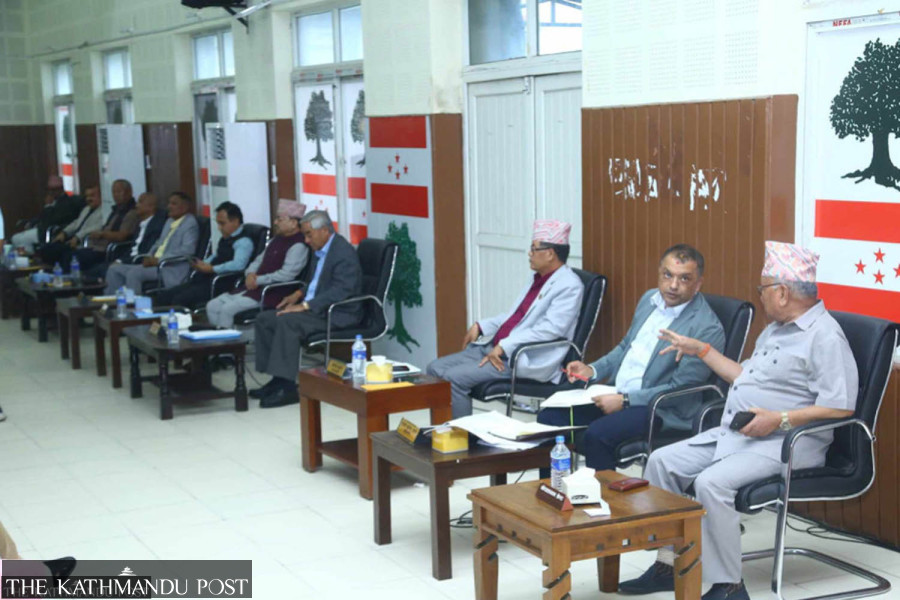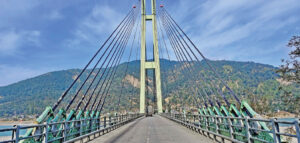
On September 1, on the last day of the Nepali Congress Central Working Committee assembly, Common Secretary Bishwa Prakash Sharma expressly encouraged Sher Bahadur Deuba, the party president, to allow up his yearnings to be the prime serve however again.
As per the seven-point assention between the Congress and the CPN-UML on July 1, UML Chairman KP Sharma Oli, the occupant prime serve, will lead the government for the to begin with two a long time. At that point Congress chief Deuba will lead the government until the races in November-December 2027.
Sharma encouraged Deuba to take off the prime minister’s post for another senior Congress pioneer. Deuba supposedly rejected the proposition outright.
“I will not donate up the position fair since somebody so desires,” Deuba supposedly said in response.
Sharma, one of the two common secretaries of the country’s most seasoned political party, had proposed an exit arrangement in his modern political proposition tabled at the Mahasamiti assembly in February for the pioneers holding state positions such as president, prime serve, ministers.
Besides Sharma’s proposition, the Mahasamiti moreover embraced the papers submitted by Vice-president Purna Bahadur Khadka and Common Secretary Gagan Thapa.
However, it moreover gave room for the central committee to adjust the proposition. When the central committee affirmed Khadka’s arrangement proposition and Thapa’s hierarchical proposition with minor changes, Sharma’s paper was pushed back to be considered whereas revising the national constitution.
Sharma proposed one term for the [country’s] President, two terms for the prime serve, three terms for priests, and four terms for lawmakers.
Sharma’s proposition on term limits on people serving as the country’s president or the prime serve is a national or maybe than the party’s issue, so it has been conceded, concurring to party leaders.
Most of the Congress central pioneers who talked at the assembly, which kept going nearly a month with holes in between, claimed that settling a time constrain for the administration was opposite to the law based guideline that the party champions.
UML chief whip Mahesh Bartaula too says that since legislative issues is a deliberate work, the lawmakers ought to be able to contribute to the society for as long as they want.
“Nonetheless, the exit approach proposition is thought-provoking,” Bartaula told the Post.
As a modern era of pioneers is however to be completely created, the open still trusts the more seasoned edit of pioneers, he contends. “Those competing for beat positions are however to pick up the public’s credibility.”
For Krishna Pokharel, a teacher of political science, it would be unnatural to revise the structure to address Sharma’s demand.
“In nations where individuals specifically choose their prime serve, altering the structure to constrain the official head’s term might be reasonable” Pokharel told the Post. “However, in a nation like Nepal where the parties select the prime serve, exit arrangement ought to or maybe be said in the party’s statute.”
Had Nepali pioneers disguised the soul of the parliamentary framework, their passage and exit focuses require not have been examined. “The parliamentary framework in Nepal has been vulgarised,” Pokharel added.
According to political specialists, in spite of the Congress pioneers scrutinizing the exit arrangement at the central committee, the proposal’s open request is growing.
They see no elective to its usage, sooner or later.
One reason for developing open disillusionment with political parties is that the same ancient faces have proceeded in authority positions for a long time. If there were a term restrain for a pioneer in a legislative or party position, people’s disappointment would some way or another be addressed.
Experts say the later political change in Bangladesh and the political emergency of Sri Lanka two a long time back were due to the ceaseless run the show by a single individual or a single family.
One reason a few vote based systems battle is their political leaders’ boundless starvation for control, Uddab Pyakurel, a political examiner, told the Post. “In Nordic nations, there is no require to set term limits for pioneers as there is as of now a solid equitable culture there.”
Despite having pioneers like Donald Trump, American vote based system still works, somewhat since of the term limits, Pyakurel reasoned.
“If Nepal is to fortify its equitable framework, it must actualize the exit approach for political leaders,” he said.
Some political specialists see issues indeed after presenting a term limit.
Arguing that restricting the residency for beat positions alone is not sufficient to put controls on despotic propensities, Khagendra Prasai, another political investigator, said: “The major issue is creating political quirk and culture.”
Calls for the best party administration making way for a unused era are developing not fair in the Congress. Indeed amid the CPN (Maoist Middle) standing committee assembly final month, Appointee Common Secretary Janardan Sharma addressed Pushpa Kamal Dahal’s continuous administration for about 35 a long time. Sharma indeed encouraged Dahal to leave the position.
Experts say pioneers with constrained terms figure it out they must get a part done inside the given time at the best. There is no moderate cooldown period.
The current set of beat party leaders—Deuba, Oli and Dahal in particular—have been in control for two or three decades, more than once accepting the country’s best official position.
Article 216 (7) of the Structure of Nepal says a individual chosen leader for two terms will not be qualified to be a candidate in future civil decisions. Article 215 (7) has a comparable arrangement for chairpersons of rustic municipalities.
The structure too has a two-term restrain for President.
While all other best overseeing posts come with settled terms, there are limits on how numerous times the prime serve, chief priests, priests, and legislators can serve.
This permits lawmakers to possess office for as long as they select, anticipating the administration handover to the following generation.
In the see of Mighendra Bahadur Karki, official chief of the Middle for Nepal and Asia Ponders (CNAS) at Tribhuvan College: “Leaders who know that their peers, indeed junior colleagues, may sometime in the not so distant future be their bosses may be more keen of their conduct. Destitute conduct and status uneasiness might be decreased, expanding the room for collaboration.”
If senior pioneers know that they require to bow out of the government or the party after a specific time, they are more likely to prepare and advance junior pioneers to take their put, Karki told the Post. “This in turn will develop a sound political culture.”
But he cautioned that the address of term constrain is not direct. “The exit approach, if it is to be executed, ought to be system-centric or maybe than focusing on specific pioneer.
Related
Might effective lasers open cheap combination power





